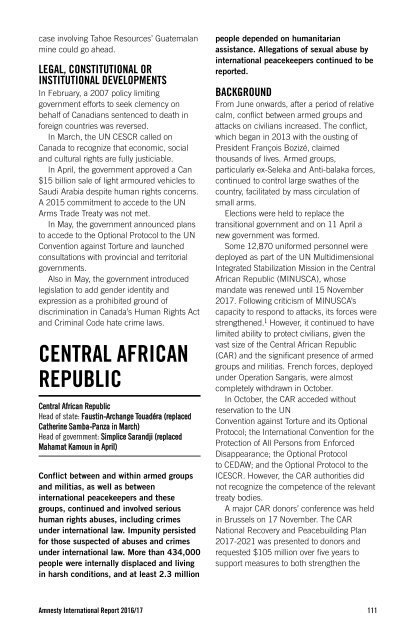AMNESTY INTERNATIONAL REPORT 2016/17
2lEHU9j
2lEHU9j
Create successful ePaper yourself
Turn your PDF publications into a flip-book with our unique Google optimized e-Paper software.
case involving Tahoe Resources’ Guatemalan<br />
mine could go ahead.<br />
LEGAL, CONSTITUTIONAL OR<br />
INSTITUTIONAL DEVELOPMENTS<br />
In February, a 2007 policy limiting<br />
government efforts to seek clemency on<br />
behalf of Canadians sentenced to death in<br />
foreign countries was reversed.<br />
In March, the UN CESCR called on<br />
Canada to recognize that economic, social<br />
and cultural rights are fully justiciable.<br />
In April, the government approved a Can<br />
$15 billion sale of light armoured vehicles to<br />
Saudi Arabia despite human rights concerns.<br />
A 2015 commitment to accede to the UN<br />
Arms Trade Treaty was not met.<br />
In May, the government announced plans<br />
to accede to the Optional Protocol to the UN<br />
Convention against Torture and launched<br />
consultations with provincial and territorial<br />
governments.<br />
Also in May, the government introduced<br />
legislation to add gender identity and<br />
expression as a prohibited ground of<br />
discrimination in Canada’s Human Rights Act<br />
and Criminal Code hate crime laws.<br />
CENTRAL AFRICAN<br />
REPUBLIC<br />
Central African Republic<br />
Head of state: Faustin-Archange Touadéra (replaced<br />
Catherine Samba-Panza in March)<br />
Head of government: Simplice Sarandji (replaced<br />
Mahamat Kamoun in April)<br />
Conflict between and within armed groups<br />
and militias, as well as between<br />
international peacekeepers and these<br />
groups, continued and involved serious<br />
human rights abuses, including crimes<br />
under international law. Impunity persisted<br />
for those suspected of abuses and crimes<br />
under international law. More than 434,000<br />
people were internally displaced and living<br />
in harsh conditions, and at least 2.3 million<br />
people depended on humanitarian<br />
assistance. Allegations of sexual abuse by<br />
international peacekeepers continued to be<br />
reported.<br />
BACKGROUND<br />
From June onwards, after a period of relative<br />
calm, conflict between armed groups and<br />
attacks on civilians increased. The conflict,<br />
which began in 2013 with the ousting of<br />
President François Bozizé, claimed<br />
thousands of lives. Armed groups,<br />
particularly ex-Seleka and Anti-balaka forces,<br />
continued to control large swathes of the<br />
country, facilitated by mass circulation of<br />
small arms.<br />
Elections were held to replace the<br />
transitional government and on 11 April a<br />
new government was formed.<br />
Some 12,870 uniformed personnel were<br />
deployed as part of the UN Multidimensional<br />
Integrated Stabilization Mission in the Central<br />
African Republic (MINUSCA), whose<br />
mandate was renewed until 15 November<br />
20<strong>17</strong>. Following criticism of MINUSCA’s<br />
capacity to respond to attacks, its forces were<br />
strengthened. 1 However, it continued to have<br />
limited ability to protect civilians, given the<br />
vast size of the Central African Republic<br />
(CAR) and the significant presence of armed<br />
groups and militias. French forces, deployed<br />
under Operation Sangaris, were almost<br />
completely withdrawn in October.<br />
In October, the CAR acceded without<br />
reservation to the UN<br />
Convention against Torture and its Optional<br />
Protocol; the International Convention for the<br />
Protection of All Persons from Enforced<br />
Disappearance; the Optional Protocol<br />
to CEDAW; and the Optional Protocol to the<br />
ICESCR. However, the CAR authorities did<br />
not recognize the competence of the relevant<br />
treaty bodies.<br />
A major CAR donors’ conference was held<br />
in Brussels on <strong>17</strong> November. The CAR<br />
National Recovery and Peacebuilding Plan<br />
20<strong>17</strong>-2021 was presented to donors and<br />
requested $105 million over five years to<br />
support measures to both strengthen the<br />
Amnesty International Report <strong>2016</strong>/<strong>17</strong> 111


